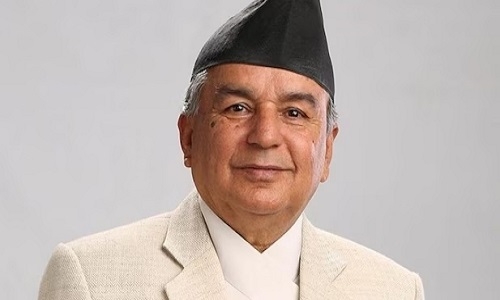Ram Chandra Poudel is Nepal’s new President
| Date :10-Mar-2023 |

KATHMANDU,
RAM Chandra Poudel of Nepali Congress was on Thursday elected as the new President of Nepal, amid increasing political instability in the country ruled by a fragile coalition headed by Prime Minister Pushpa Kamal Dahal ‘Prachanda’. Poudel, a common candidate of the eight-party alliance that included Nepali Congress and Prime Minister ‘Prachanda’-led CPN (Maoist Center), received the vote of 214 lawmakers of Parliament and 352 provincial assembly members. “Hearty congratulations to my friend Ram Candra Poudelji for being elected as the President,” Nepali Congress chief Sher Bahadur Deuba tweeted.
With the support from eight political parties, 78-year-old Poudel’s victory was certain. His rival Subas Chandra Nebmang had support of former Prime Minister KP Sharma-led CPN-UML. This is the third presidential election in Nepal since the country became a republic in 2008. The tenure of the current President, Bidya Devi Bhandari, will end on March 12. The total number of voters for the election of the President is 882, consisting of 332 Members of the Parliament and 550 members of the provincial assemblies of the seven provinces. Election Commission spokesperson Shaligram said 518 provincial assembly members and 313 members of Parliament cast their votes in the presidential election. Poudel earlier expressed confidence that the lawmakers will elect him. “I am fully confident that the members of the federal Parliament and provincial assemblies will vote for me. I believe that they will make the right judgement of my long struggle,” he said.
The outcome of the election could impact the stability of the Government headed by Prime Minister “Prachanda”.
Oli-led CPN-UML, Nepal’s second largest party in Parliament, withdrew its support to Prime Minister “Prachanda”-led Government following a rift over backing Poudel for the presidential poll. The term of office of the President will be five years from the date of election and an individual can be elected for the post for only two terms.
Although the post of President is largely ceremonial, Nepal’s political parties have lately shown a growing interest in the post owing to the discretionary powers the Constitution accords to the post. The Rastriya Prajatantra Party (RPP), which has 14 lawmakers in the House of Representatives and 28 lawmakers in the provincial assemblies, decided to stay neutral in the presidential election. The Nepal Workers and Peasants Party also did not participate in the presidential election.






